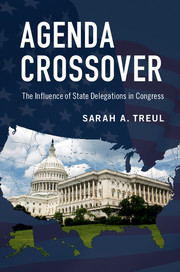Book contents
- Frontmatter
- Dedication
- Contents
- List of Figures
- List of Tables
- Acknowledgments
- 1 State Delegations in Congress
- 2 A History of State Delegations
- 3 State Delegations and Legislative Behavior in the House
- 4 State Delegations and Legislative Behavior in the Senate
- 5 Agenda Crossover in the U.S. Congress
- 6 Rethinking State Delegations in Congress
- Appendix A Interviews
- Appendix B Wisconsin's Unwritten Rule
- Bibliography
- Index
1 - State Delegations in Congress
Published online by Cambridge University Press: 13 April 2017
- Frontmatter
- Dedication
- Contents
- List of Figures
- List of Tables
- Acknowledgments
- 1 State Delegations in Congress
- 2 A History of State Delegations
- 3 State Delegations and Legislative Behavior in the House
- 4 State Delegations and Legislative Behavior in the Senate
- 5 Agenda Crossover in the U.S. Congress
- 6 Rethinking State Delegations in Congress
- Appendix A Interviews
- Appendix B Wisconsin's Unwritten Rule
- Bibliography
- Index
Summary
My state is certainly important. [My delegation] is second only to the party in thinking about what influences my [legislative] behavior. I might not always vote with the delegation, but I am always interested in what the delegation is working on. —Member of Congress, 2011
Academics spend too much time talking about parties and not enough time understanding states. —Member of Congress, 2011
Representation in the U.S. Congress is frequently discussed in terms of states. Pundits and the general public tend to picture a member of Congress as a delegate from a specific state, casting votes and sponsoring legislation in a manner consistent with the state's economic and political interests. Members of Congress also emphasize the importance of their states when asked what influences their behavior in Congress – often, as the first member did above, listing their states and the delegation second only to their political party in importance (Clausen 1972; Truman 1956). The importance of the state in the members’ minds is unsurprising when we consider that it is the residents of the state that reelect the members of Congress. The electoral connection to the state requiresmembers to know what is happening in the state and stay aware of any changing policy preferences in the constituency. The other members of the state delegation provide the member with plentiful information regarding changes back home. In fact, despite the intense polarization that has developed in Congress over the last decade or two, the representational unit of a state delegation continues to play a key role in shaping individual legislative behavior and, thereby, the macro public policy agenda of Congress. State delegations continue to be interesting organizational units in Congress, and, under certain conditions, they have the power to overcome partisanship. State delegations can affect what legislation is on the agenda and, more important, provide useful information to their members to aid them in their bids for reelection. Given the emphasis still placed on states by members of Congress and congressional observers (although, in the mind of the member above, not nearly enough by political scientists), this book explores the role of state delegations in Congress, focusing not just on intra-chamber behavior but also cross-chamber relationships within the delegation.
I am particularly interested in how these inter-chamber relationships can help the delegation's members provide quality representation to their constituents and even aid them in their reelection efforts.
- Type
- Chapter
- Information
- Agenda CrossoverThe Influence of State Delegations in Congress, pp. 1 - 26Publisher: Cambridge University PressPrint publication year: 2017



